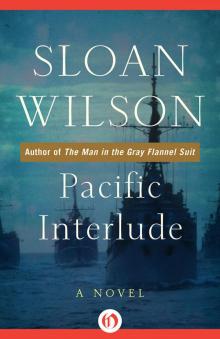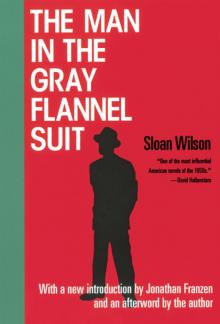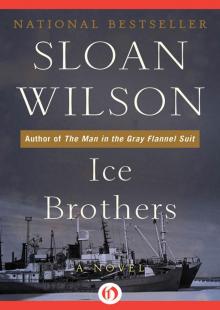- Home
- Sloan Wilson
Ice Brothers Page 8
Ice Brothers Read online
Page 8
While all this was going on, Paul was standing on a steel gun deck that had just been installed forward of the bridge of the Arluk. Four shipyard workers were welding this to some heavy steel cones about four feet high, the pedestals of 20-millimeter antiaircraft guns. The sparks from their torches were shooting into the blankets and clothes drying on the rail and an unruly group of seamen and machinists’ mates was loudly objecting. To reply to their accusations, a stout welder took off her mask, revealing a mass of dark red hair. Realizing for the first time that she was a woman, the crew gathered around, giving loud catcalls and whistles. The woman yelled indignantly at them in a high, piercing voice, and amid much laughter a machinist’s mate invited her down to the engineroom for activities which, he said, would be much more helpful to the war effort than welding. The woman started to swear, the men began to laugh, and Paul began to yell, “Quiet, silence!” but no one paid the slightest attention to him.
At this moment Mowrey stepped between two blankets that were hanging from a clothesline over the rail, and like an actor stepping through a curtain, jumped to the well deck, his jackboots making a sharp report on the pine decks which was heard above the pandemonium. Everyone turned toward him and there was instant silence. Mowrey stood almost at attention, the sun gleaming on his dark glasses and gold accoutrements. His haughty gaze traveled from the bow, where underpants flapped on the railings, over the motley crew amidships, to the stern, where more shirts and blankets flapped on every rail and line. He said nothing, and his silence, which became more and more tense as it continued for a full minute, was more effective than any disgust he could have voiced. When he finally spoke his voice astonished everyone because it was deceptively calm, even pleasant, and he gave a strange smile, which was somehow both sweet and ominous.
“Is the executive officer aboard?” he asked.
Snapping out of a kind of trance, Paul hurried to him and saluted. “I’m the exec,” he said. “Paul Schuman.”
Mowrey returned the salute gravely. “I am your new commanding officer. Bring the men to quarters and I shall read my orders.”
“Quarters, quarters!” a coxswain started to yell without being asked, and the cry was repeated throughout the ship. Men poured from hatches. They formed three lines on the well deck and they looked like a bunch of pirates, Paul realized suddenly. Because most of their clothes were drying, many of them wore dirty dungarees and no shirts. The knowledge that they were now assigned to the Greenland Patrol had caused many of them to start beards which were new enough to look thoroughly disreputable. They stood uneasily, scratching their arms and blinking into the bright sunlight.
“Attention,” Paul said.
The men stiffened into uneven lines. Farmer, who stood in the front row, kept rubbing his chin nervously. At this moment Green walked from the wardroom. He had been studying Knight’s Modern Seamanship most of the night and had been asleep when he heard the men yelling “quarters.” Uncertain of what this meant, he had simply put on his rumpled blue uniform and without bothering to shave, was ambling forward. His tall, stooped, gaunt figure looked the very antithesis of everything military as he leaned against the big winch to watch the strange proceedings. Mowrey stared at him unbelievingly for an instant, but looked away without saying anything. There was another long minute of tense silence.
“At ease!” Mowrey finally barked.
The shoulders of the men slumped a little, but they still looked anything but at ease.
“My name is Clifford P. Mowrey. I shall now read my orders.”
Taking a crisp envelope from his coat pocket, Mowrey extracted a piece of paper and read in a deliberate monotone: “To Clifford P. Mowrey, lieutenant commander, United States Coast Guard. From, Commandant U.S. Coast Guard, Washington, D.C. Subject: Order to active duty. Paragraph one: You are herewith ordered to active duty. Paragraph two: You are herewith assigned as commanding officer of U.S. Coast Guard Cutter Arluk. You will proceed immediately to District One Headquarters, U. S. Coast Guard, for transportation to that vessel. Immediately upon arrival aboard, you will assume command.”
He folded the orders with great deliberation, put them back in the envelope and pocketed it. For perhaps thirty seconds he silently looked up at the sky, like the minister hoping for divine inspiration.
“This morning,” he said in his oddly casual, pleasant tone, “I spent about two hours at the district office going over the personnel records of every man aboard this ship. I know everything about every one of you that the Coast Guard knows.”
There was another long silence during which he seemed to stare directly into the face of every man present.
“Now some of you already know and you all will soon find out that I am widely known as ‘Mad Mowrey.’ Don’t let that scare you. Actually, I am a very reasonable man. You can be sure, at least, that I know my business. I’ve been at sea steadily since I was twelve years old, when I went as a cabin boy on a fishing schooner. I’ve put in twenty years with the navy as a chief boatswain’s mate and in the First World War the navy made me a lieutenant. Later I went in the Coast Guard. I know the Arctic as well as any man alive except the Eskimos. You’ll be safe with me if you do what I tell you.”
There was another long pause.
“If you don’t do what I tell you, you won’t be safe,” he said mildly, and flashed them his sharklike, but curiously charming smile. No one dared to smile back. Mowrey looked at the sky and then his eyes focused on the new steel gun deck. The workers there hastily retreated.
“Now let me tell you a little about Greenland,” Mowrey continued pleasantly. “It’s not the terrible place you’ve heard—I’d rather be in Greenland than anywhere in the world. It’s God’s country and it’s a man’s country. Though you don’t think it, a sailor can have one hell of a good time there, better than anything you can find here.”
He paused again.
“But the Arctic is also the most dangerous place for ships in the world, even when the Germans aren’t there, which they are—don’t make any mistake about that. The Arctic is a great place for sailors who know exactly what they’re doing, and a great place for everyone else to die.”
This time he paused only a moment before adding, “Now I don’t want to die and I don’t think you do, not yet anyway. Even old as I am, the thought of dying makes me mad. That’s the real reason why they call me ‘Mad Mowrey.’ And because the thought of dying makes me mad, inefficiency makes me mad, ignorance makes me mad and a lack of discipline makes me mad. A filthy ship makes me mad, it makes me madder than hell.”
As he said this, his face suddenly turned truly ferocious. His blunt jaw jutted out and his ice-blue eyes seemed to shoot fire.
“If I took this ship to the Arctic the way she and her crew are now,” he continued, “she wouldn’t last a month, even if the Germans didn’t find her. I don’t think you young fellows want to die any more than I do, so don’t complain when I whip you into shape. You may think that the Greenland Patrol is the worst thing you can get and that you’ll just be transferred if you foul up, but there are worse things I can send you to, like small shore installations in Greenland where even the Eskimos won’t go. I’m warning you that I’m looking for an example and I’ve got just such a shore installation all picked out. The district personnel officer has promised to cooperate with me. If you want a transfer, you’ll get it fast. On the other hand, if you cooperate with me, we can make this into a happy ship and a safe one.”
His expression turned pleasant again as he continued. “I want to get up to Greenland as fast as possible. We’re needed up there—some of those colonies of Eskimos and Danes haven’t had supplies all winter. More than that, the first ships up there this spring will get the best assignments. The last will get weather patrol, steaming in a circle in the middle of Davis Straits for thirty days at a time, drawing the subs with steady radio signals. If you want that, delay me.”
The men looked scared. They shifted their feet uneasily.
&nbs
p; “There’s no way I can whip this ship and this crew into shape fast by being a nice guy,” Mowrey said quietly, but his face was now stern. “Hate me all you like, but remember that I’m saving your lives. All leaves and liberty are hereby cancelled aboard this ship until further notice. If you work with me, you’ll get one, maybe two nights ashore before we sail, if you don’t, you’ll get none. It’s time for learning your jobs, not liberty. That goes for the officers as well as the men, everyone except me. I’m the only one who already knows his business.”
There was one last long pause during which he stared stonily at the men before he finally hissed, “Dismissed!”
Silently the men shuffled toward the forecastle.
“Come with me,” Mowrey said to Paul and led the way to the pilothouse. For a moment he stood by the wheel staring at the new gun deck and the gun pedestals. The yard workers reappeared and began to weld ready boxes for ammunition into place. After watching them a moment, Mowrey strolled out on the new steel deck with Paul following and examined the pedestals.
“Is this welding job finished?” he asked a burly workman.
“Yes, sir.”
Moving with astonishing speed, Mowrey placed his back against a rail and delivered a vicious kick to the midsection of one of the gun mounts. It came loose and toppled over with a loud clatter.
“I don’t want no gun mounts I can kick off,” he said mildly.
“Yes, sir. That one hadn’t really been inspected yet.”
Without reply Mowrey walked back to the pilothouse with Paul following meekly. Standing moodily by the wheel again, Mowrey took a cigar from his breast pocket and lit it. There was another long minute of silence.
“Mr. Schuman, you’re a college boy, not a ship’s officer,” he said suddenly in his curiously pleasant voice.
“Yes, sir.”
“I looked at your papers, but I forget. Did you go to Yale or Harvard?”
“Boston University, sir.”
“They’re all the same to me. You look like a Yale.”
Paul said nothing. He was not tempted to laugh.
“So what I get for officers here is a Yale, a Sheenie and a fisherman who’s never been farther north than Georgia Banks and who’s too old to learn.”
Still Paul said nothing.
“After we sail, I can run this ship alone night and day for maybe a month, but I’m not as young as I used to be, and sooner or later I’ll tire. By that time you better be able to stand a watch and handle the men.”
“Yes, sir.”
“Don’t count on Mr. Farmer. There’s two kinds of sailors: one goes on local knowledge, and the other goes on the knowledge of how to run a ship anywhere. Fishermen go on local knowledge. Get them out of their own territory, and they ain’t much better than lubbers. And no fishermen ever knew how to handle men on a long voyage.”
“Yes, sir.”
“And we can’t count on Greenberg. I don’t know how he ever got in the service in the first place.”
“His name is Green, I believe, sir. He has no experience at sea but he seems very intelligent to me.”
“You ever hear of a Sheenie sailor?”
“Well, none that I can name at the moment. I’m sure there have been many.”
“I never seen a Sheenie sailor, except for yeomen and supply officers. Tell Greenberg he’s our supply officer, along with communications, and when I give him a list of things I want, I want all of it fast, even if he has to steal it.”
“Yes, sir.”
“Now Yale, I want you to remember one thing. I’ve got no hope for Greenberg and no hope for Mr. Farmer, but you I just might be able to shape up. Six months from now I have to send in a fitness report on you. If you’ve shaped up, I’ll make it good enough so you just might get a command of your own inside of a year—in time of war, things move fast. But if you fuck up, I’ve got a job already picked out for you. You’ll be in command of a Quonset hut so far north that they won’t even think of looking for you until the war’s been over for a year, if they remember you then.”
“Yes, sir.”
“Now you can start by getting this ship cleaned up. If the men have to dry clothes and bedding, they can rig lines ashore.”
“Aye, aye, sir.”
“And clean up that stack where the name of the ship is. Arluk means hunter—get somebody to paint on a picture of an Eskimo throwing a harpoon. And over the name of the ship I want the Coast Guard motto. Do you know what that is?”
“Semper Paratus, always prepared,” Paul said with a smile.
“Well, it ain’t semiparatus mañana, like it looks this ship should have painted up there now. Put up the Coast Guard motto and under that put my personal motto in red letters: DON’T FOUL UP HERE.”
“Aye, aye, sir!”
“Now, git!”
The men jumped to the task of taking in their laundry, but one seaman had been sent ashore for supplies, and his garments continued to flutter from a rail on the forecastle head. Before Paul could have these taken in, the general alarm rang, a Klaxon horn which throbbed with ear-splitting urgency. For the first time Paul heard the shrill call of a boatswain’s pipe aboard that ship, followed by the hoarse call, “Fire drill, fire drill!”
There was a disorderly scramble for the hoses which Mowrey watched sardonically from the gun deck. When they finally got pressure and were directing thick jets of water into the bay, he strolled to the well deck, took the nozzle of one hose from the crew and directed it toward the offending bits of laundry on the forecastle rail, sending them spinning into the harbor.
“Secure from fire drill,” he said pleasantly.
CHAPTER 8
Captain Mowrey did not allow any of his officers or men to go ashore that day even to go to a telephone. Instead he arranged to allow each man to make one short call from the telephone on the bridge. To make sure that no military secrets were divulged, he sat on a high stool near the telephone, smoked a cigar and sardonically listened. It was while he was placing his call to his wife that Paul realized that his admiration for Mowrey was mixed with sheer hatred.
“Hello, Sylvia?” Paul said.
“When are you coming home?”
“I can’t. Not for weeks maybe.”
“Why?”
“I can’t explain now and I may not be able to call again for days.”
“What’s going on?”
“Sylvia, there’s a war going on—that’s just about all I can say.”
“Are you mad at me? You sound so angry.”
“I’m not mad at you! I’ll call as soon as I can. Don’t worry about me—I’m in no danger at all—”
“I love you,” she said.
“I love you more than I ever have in my life,” he concluded, and hung up.
“That’s nice,” Mowrey said, licking the end of his cigar. “That’s sweet. Now if you want to save your ass for your lover-girl, get it below and put it on a chair. I want a clean copy of a watch, quarter and station bill right now.”
As soon as Paul finished one task on that memorable first day under Mowrey’s command and tried to steal enough time for a cup of coffee, he heard his captain bellowing from the bridge, “Yale! Yale! Send that bastard Yale up here!”
Green had it easier, because as supply officer he was often sent ashore, but many of the items which Mowrey demanded that he get, such as a standby gyrocompass and full sonar gear, were simply not issued to trawlers. When he reported this to Mowrey he got such a brutal tongue-lashing, all couched in the most vile anti-Semitic language, that his long mournful face went pale, and he developed such a tremor in his fingers that he put his hands in his pockets, which infuriated Mowrey all over again.
“I’ll try, I’ll try,” Green kept saying, and stayed ashore as much as possible, though Mowrey demanded that he spend his nights aboard.
Farmer was the only man on the ship who did not seem in the least affected by Mowrey. He just smiled when the captain called him “that farmer” and went a
bout the ship cheerfully doing the best he could.
Most of the trawler captains ate in the forecastle with the other officers and men, but Mowrey dined alone in his cabin, big ship style. The first night Cookie carried up a tray with a dinner which included a choice steak with mushroom sauce, delicately whipped potatoes, fresh vegetables that he had purloined during a visit to the kitchen of the Ritz-Carlton Hotel and a selection of French pastries which he had made himself. Mowrey was malevolently staring at Cookie’s tall chef’s hat when he removed the inverted bowl covering his repast. He was, as a matter of fact, on the point of grabbing his nonnautical headgear and pitching it overboard when he realized that he was being served no ordinary Coast Guard meal. After tasting the steak, he reached into a drawer, took out his sealskin overseas cap and put it on his head.
“Cookie, you and I are the only two men aboard this ship who have earned the right to wear nonregulation hats,” he said.
“Yes, sir,” Cookie replied. “I work hard all day to fix food like this, and chefs are generally allowed to go ashore every night, while we’re in port, of course. Is that all right with you, sir?”
“Cookie, as long as we all get food like this, you can go ashore whenever you want, but if the quality of the grub falls off, you’re restricted.”
“Yes, sir!”
Cookie tried the first salute of his life and hurried happily back to his galley.
Mowrey disapproved of the watch, quarter and station bill that Paul drew up and demanded that it be corrected that very night. Paul had no idea how late it was when he finally fell into his bunk, too exhausted even to commiserate with Green, who lay in his bunk, staring up as though he were a corpse. Farmer was already asleep, snoring contentedly.
A little before three in the morning, the three officers were awakened by the howl of the general alarm and the shriek of the boatswain’s pipe, which was followed by “Collision Drill, Collision Drill!”

 A Summer Place
A Summer Place Pacific Interlude
Pacific Interlude Man in the Gray Flannel Suit
Man in the Gray Flannel Suit Ice Brothers
Ice Brothers